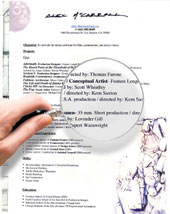 |
In the last few years, the reputation of the résumé has gotten a beating. In 2001, George ’Leary wanted the plum job in collegiate sports — head coach of Notre Dame football — so badly that he included on his résumé a masters degree he did not have and letters for playing football that he never earned.
Ronald L. Zarrella, the chief executive of Bausch & Lomb, claimed to have had a masters in business administration from New York University. Shares in the company dropped three percent the day the company divulged Zarrella’s résumé-fudging.
David J. Edmondson, the chief executive of RadioShack, was fired after a newspaper investigation showed that his résumé was padded with two degrees in psychology and theology, degrees he never got from a university that was not even accredited.
Notre Dame, Bausch & Lomb and RadioShack are huge organisations, and if they got fooled, how can small businesses, cope with a cheating epidemic?
Brad Fredericks, a co-founder of ResumeDoctor.com, a company in South Burlington, Vermont, that advises clients on résumé writing, had his employees pull about a thousand of them that had been uploaded to the company website and check them for easily identifiable facts like job titles, education and dates of employment.
“What we found was shocking,” Fredericks said. “We discovered that 42.7 per cent of them had significant inaccuracies. That was unbelievable to us.”
Businesses are trying to be more vigilant. A 2005 survey by the Society for Human Resource Management said that almost half of human-resource specialists had increased the time they spent checking résumés. The survey also found that 52 per cent had started contracting a lot of the background checking.
Tom Medvec has run the Medvec Resources Group, a job placement firm in Ohio, for the last 20 years. He used to be in the machine tool business himself, and said that now that even lathe operators have résumés, it is essential to have professionals like him check them.
“Certainly, when I started, machinists did not use recruiters, so they didn’t have résumés,” Medvec said. “They filled out applications and waited to be called. Now with recruiting more prevalent and all the job dot-coms, suddenly these guys need résumés. They don’t know how to do them. Then they worry that they aren’t good enough, so more and more lying is going on.”
One easy check, the experts say, is education. Universities and instructional institutions are usually co-operative about sharing at least whether a person graduated or attended the school, and have access to databases. They too want to fight the growing tide of falsification.
The Rutgers University Career Services office, for instance, did an audit last year and found that 20 per cent of students submitting résumés had inflated their grade-point averages.
Richard White, the director of the Rutgers office, said that this was partly an outgrowth of the Internet age. He said employers should be especially wary of résumés that come in online, since it seems applicants are more willing to fib that way.
“I think people are more loose about information than in the good old days,” White said. “It used to be that you had to submit a paper résumé every time you applied for a job. I think that it must have been that that was a tangible act. So you felt more accountable each time. Now it is pushing a button, sending a bunch of type on a computer screen off somewhere. It isn’t real.”
With little time or personnel to waste, small businesses might have to resort to effective strategies. One executive at a large machine shop, who did not want his name used to keep his methods safe, said he had resorted to the pop quiz.
“Before they walk into the shop, I give them a questionnaire,” he said. “I ask what attachments have you used on this or that machine? I ask them technical terms. I ask them a little about a machine, something only one who has worked on one will know. It saves a lot of time.”
Matt FitzGibbons, the human-resource manager for Manth Brownell, a precision-turned parts company in Kirkville, New York, said he had been cautious lately looking at résumés, particularly at dates of employment. “The economy here in upstate New York has been a bit rough in the last six years, so I see résumés, say, that are more vague in when they worked,” he said. “A ‘2004’ could mean they worked last in late 2003 and then started back in 2005, because some company closed. It’s hard to fool me, though, since I know which companies folded when.”
Résumé fraud may be cyclical. Jude M. Werra, the president of Werra & Associates, an executive search firm in Brookfield, Wisconsin, puts out what he calls the Liars Index, a survey of how many executive résumés have falsified education claims. He divides the number of people who have misrepresented their education by the total number of people whose education his company has checked. For the first half of 2006, Werra said, he found 16.07 per cent of résumés had education misrepresentations. The lowest number came in 2003, during a hiring binge and soon after the Notre Dame event.
“Small businesses can’t check everything, but they can check education easily,” Werra said.
But don’t stop checking completely. “The baby bust is coming, and small companies may stop being so vigilant as the demand for good people goes up,” Werra said. “They may think well, ‘Let’s go before he goes to someone else’. In the end, it will pay to step back, check at least the things you can. There are too many résumés out there with lies not to.”











